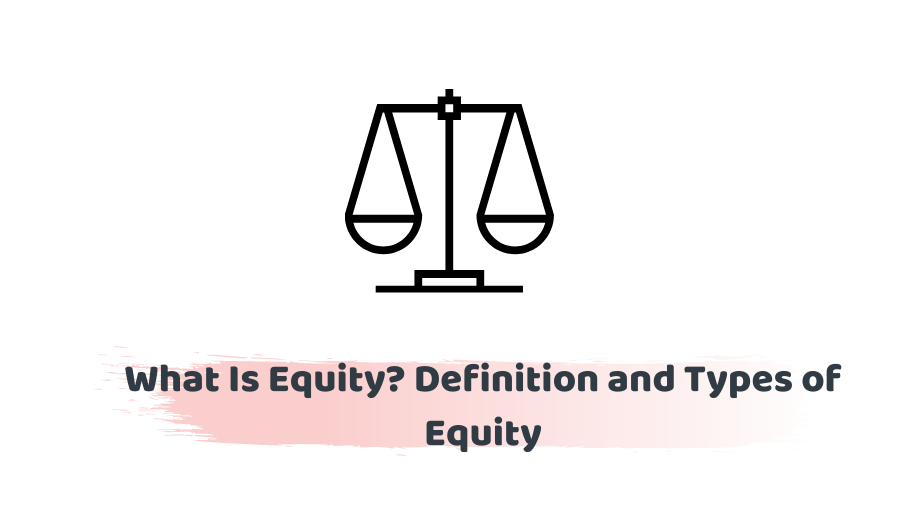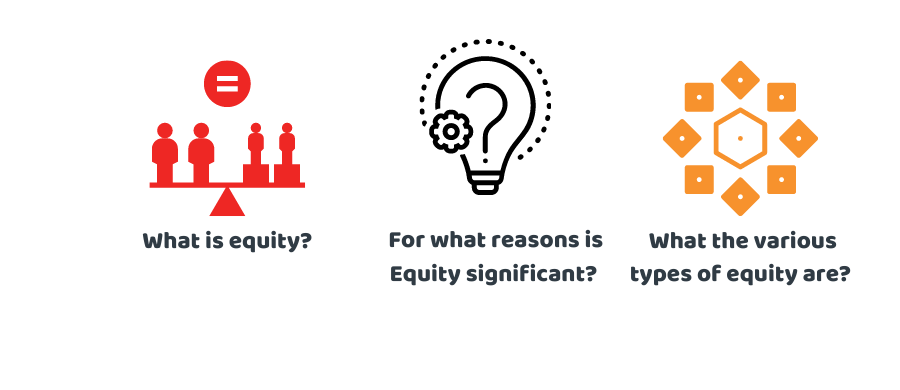What is equity? Equity is a term regularly found on an organisation’s monetary record, but at the same time, it’s a typical term utilized among financial terms and in bookkeeping, just as in individual budgets. On this page, you’ll discover more about:
- What is equity?
- For what reasons is Equity significant?
- What the various types of equity are?
What is equity?
Equity is characterized as the measure of cash that could be gotten back to an organisation’s investors once every one of the resources is exchanged, and all organisation obligations are paid off. Equity has a place with every investor in an openly recorded organisation, or the owner(s) if the organisation is private.
Investor equity can likewise address the book worth of an organisation, which is determined by the distinction among resources and liabilities on an organisation’s asset report. The utilization of investor equity regularly happens in bookkeeping, and the asset report condition is as per the following:
Liabilities + Equity = Assets
To work out the equity of a substance, you can modify the equation above to equity = resources – liabilities. This information is ordinarily utilized by investigators to decide the monetary state or the strength of an organisation.
We are a Young, Creative, Forward-Thinking, and Tech-Driven Firm of Chartered Accountants In London, with an Entrepreneurial Mindset. Do reach out to get your business problems solved.
For What Reason is Equity Significant?
Let’s delve deep into why equity is significant in light of the fact that it gives a decent outline of the monetary wellbeing of an organisation, and can be utilized to produce assets and interests into the organisation for things like development and extension. Equity is sold as offers to financial backers, who thus produce pay for the organisation.
Investor equity can be negative or positive. On the off chance that the equity is positive, this implies that the organisation has sufficient resources to cover its liabilities. Then again, in case an organisation’s equity is negative, its liabilities surpass its resources.
An investor’s equity alone can assist with deciding the strength of an organisation, and when utilized close by different instruments, financial backers can precisely dissect an association’s monetary prosperity.
What are the Various Types of Equity?
Equity doesn’t just assess an organisation’s wellbeing. In more broad terms, equity is the level of possession found in any resource, either in an organization or actually, in the wake of deducting all obligations. Coming up next are varieties of organization equity:
- Any stock or different protections that address proprietorship in a privately owned business are called private equity.
- On all organisation asset reports, the number of assets contributed by investors, including income or misfortunes, may likewise be known as an investors’ equity.
- With regards to edge exchanging, or acquiring cash from a representative to exchange a resource, the worth of protections in an edge account less what the record holder acquired from the financier, is equity.
- At the point when a business is pronounced bankrupt and goes into liquidation, its equity is the measure of cash staying after the business takes care of its obligations to its loan bosses. This kind of equity is known as proprietorship equity or at-risk capital.
Interested in our services? Why not speak to one of our qualified accountants? Give us a call on 0203 4411 258 or request a callback.
Private Equity:
Traded on an open market speculations show the market worth of equity as seen through the organisation’s offer cost and its market capitalization. Notwithstanding, for private substances, this market instrument doesn’t exist, which means they should utilize different types of valuation to decide their worth.
Private equity alludes to the abundance of organisations that don’t exchange openly. A similar bookkeeping condition applies in private equity, which is: esteem – liabilities = equity.
Secretly held organisations can look for financial backers by selling their offers straightforwardly. These private equity financial backers can incorporate foundations, for example, annuity reserves, college blessings, and insurance agencies.
Private equity is additionally regularly offered to assets and financial backers who spend significant time in direct speculations or those that take part in utilized buyouts of public organisations. Utilized buyout exchanges happen when an organisation gets credit from private equity to subsidize the procurement of another organisation. Income or organisation resources can be utilized to get the credit.
Private equity can come at various focuses in an organisation’s life. As a rule, youthful organisations with no income or profit will not have the option to bear to apply for a line of credit. Hence, these organisations ordinarily get their capital from companions, family, or finance managers, known as private backers.
Investors give the most private equity finance as a trade-off for early minority stakes. Financial speculators typically contribute when an organisation has made an item or administration that is fit to be brought to the market. They might sit down on the directorate to guarantee they play a functioning part with regard to organisation development.
Home Equity:
Home equity, or property equity, is the worth of the interest you own on your home. Assume you take the market worth of a property and deduct any acquired cash joined to it, for example, an exceptional home loan sum. All things considered, the extra part is the equity you own.
The measure of equity you own in your home changes after some time, in view of home loan reimbursements and any market influences that may affect the worth of the property. For instance, the store you put down qualifies you for some equity in the house, which increments as you take care of your home loan.
For instance, say the market worth of your home is £250,000, and you purchased the house with a £30,000 store and got a home loan for the leftover £220,000. This implies the property is worth more than your home loan obligation, giving you sure equity.
You can likewise consider positive to be a decent long-haul methodology to construct abundance. By step by step making contract reimbursements, you are expanding a lot of equity in the property. The accompanying table investigates the advantages and disadvantages of positive equity.
Conclusion:
So, in conclusion, you can have both positive and negative equity in a property. Positive equity is something to be thankful for, as it implies your home is worth more than your home loan, with negative equity being the inverse (more on bad equity without further ado). We hope this article helped to understand what is equity in a better way.
Still, have a question? Get in touch with us.
Disclaimer: This article intends to provide general information on Equity.






















































